Fans of Kimberly Brubaker Bradley’s The War That Saved My Life, know that people in London, England commonly lost their homes to bombings during World War II. But if someone did lose their home this way, what was life after that like?
In the first few pages of Peggy’s Letters, while in line at the butcher shop to get sausages with their rations, ten-year-old Peggy’s home is demolished by a bomb. Though thankfully, her mother, baby brother and she are safe, they no longer have a home. And Peggy’s precious biscuit (cookie) tin filled with letter to her father is lost to the rubble. All her family has now is a pram (stroller), sausages and each other. In one of Tumblebook’s great read-alouds, join Peggy in navigating her new normal living at her gruff grandad’s home and attending a new school. The British voice actor providing audio helps the reader become even more immersed in the story. Don’t miss out!
Follow this video tutorial on how to access free Tumblebooks! And click here to follow instructions on downloading and using the Tumblebook app!
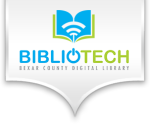 Starting today, the BiblioTech will serve all residents of Bexar County, Texas. What makes this $2.4 million library system unique is that it is the nation’s first digital public library, offering an estimated 10,000 titles (provided by 3M Cloud Library) through e-readers. Patrons will also be able to utilize hundreds of e-readers and pre-loaded enhanced e-readers for children, as well as computer stations, laptops and tablets to use on-site. Additional e-reading accommodations will be made for the visually impaired. Envisioned by County Judge Nelson Wolff, the Bibliotech is based in a predominately Hispanic, low-income neighborhood on the South Side of San Antonio, Texas, where 75 percent do not have Internet access. You can read more about this new, bookless library here and here.
Starting today, the BiblioTech will serve all residents of Bexar County, Texas. What makes this $2.4 million library system unique is that it is the nation’s first digital public library, offering an estimated 10,000 titles (provided by 3M Cloud Library) through e-readers. Patrons will also be able to utilize hundreds of e-readers and pre-loaded enhanced e-readers for children, as well as computer stations, laptops and tablets to use on-site. Additional e-reading accommodations will be made for the visually impaired. Envisioned by County Judge Nelson Wolff, the Bibliotech is based in a predominately Hispanic, low-income neighborhood on the South Side of San Antonio, Texas, where 75 percent do not have Internet access. You can read more about this new, bookless library here and here.
Olivia
 Stephen King’s newest novel Joyland is being released in print form only. He told the Wall Street Journal: “I have no plans for a digital version. Maybe at some point, but in the meantime, let people stir their sticks and go to an actual bookstore rather than a digital one.” Although considered an e-book pioneer (his 2000 story Riding the Bullet was released exclusively as an e-book) this decision is making many book retailers very happy. Joyland, published by independent publisher Hard Case Crime will be in bookstores June 4. For more details, check out this article from The Christian Science Monitor.
Stephen King’s newest novel Joyland is being released in print form only. He told the Wall Street Journal: “I have no plans for a digital version. Maybe at some point, but in the meantime, let people stir their sticks and go to an actual bookstore rather than a digital one.” Although considered an e-book pioneer (his 2000 story Riding the Bullet was released exclusively as an e-book) this decision is making many book retailers very happy. Joyland, published by independent publisher Hard Case Crime will be in bookstores June 4. For more details, check out this article from The Christian Science Monitor.
Laura
One would think that teens are lapping up e-books as fast as they can get them, however, a new report finds that is not the case. One obstacle noted by teens was too many restrictions in accessing the material. A trade survey conducted by R.R. Bowker is disputed by others in the industry, who claim that sales of YA digital books are flying through the roof. Read this lengthy discussion of the digital habits of teens on Publisher’s Weekly.
Shira S.
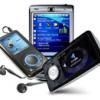
How does this sound? A program to allow libraries to pay per use for e-book downloads. Freading is a new product from Library Ideas of Fairfax, VA. Over 50 libraries are on board and as many as 40 publishers. No mention of specific costs.
Shira S.
EarlyWord points out an 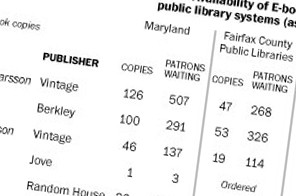 interesting article in the Washington Post about the difficulties libraries have in obtaining e-books.Some facilities do not have funds to keep up with the need and some publishers are not fully cooperating with the libraries. The article highlights the friction between slashed library budgets and the growing pressure to keep up with digital media. It will be interesting to see how this plays out. Shira S.
interesting article in the Washington Post about the difficulties libraries have in obtaining e-books.Some facilities do not have funds to keep up with the need and some publishers are not fully cooperating with the libraries. The article highlights the friction between slashed library budgets and the growing pressure to keep up with digital media. It will be interesting to see how this plays out. Shira S.
 Publishers of print books have been struggling for control in the new world of publishing. Borders has gone by the wayside in the aftermath of the shift to digital publishing and presently publishers maintain control over pricing for e-books. However, attempts to increase revenue through adding extra features has not been very successful. As John Makinson, CEO of Penguin Books, explains consumer reaction to paying for added features, “‘Well, that’s marvelous but that’s not something I’m going to pay for….'”
Publishers of print books have been struggling for control in the new world of publishing. Borders has gone by the wayside in the aftermath of the shift to digital publishing and presently publishers maintain control over pricing for e-books. However, attempts to increase revenue through adding extra features has not been very successful. As John Makinson, CEO of Penguin Books, explains consumer reaction to paying for added features, “‘Well, that’s marvelous but that’s not something I’m going to pay for….'”
(left: Random House offices, NYC)
A different aspect of the publishing battles being waged in the industry is apparent in Amazon’s Prime loyalty program for Kindle customers which allows users to choose a free book every month. Several of the larger publishers have flatly refused to join. Worries about piracy, intellectual property, and revenue are only some of the complex issues troubling publishing houses.
For now, book publishers have fared better than the music business regarding the thorny issues of ownership and compensation. It remains to be seen for just how long they can keep doing so.
Shira S.
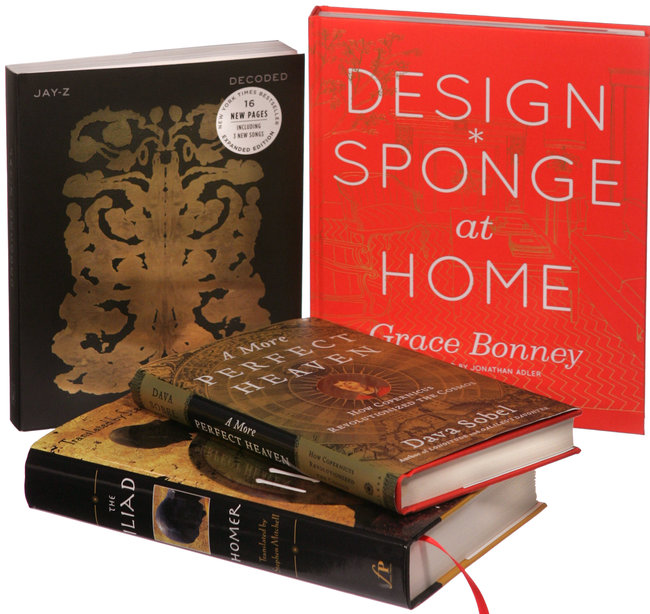 Now that e-books are becoming more convenient and more popular, many publishers are concerned that paper books will be ignored this coming holiday season. To increase their value, old-fashioned print books are getting a makeover with new and beautiful covers. ” If e-books are about ease and expedience, the publishers reason, then print books need to be about physical beauty and the pleasures of owning, not just reading. ” Read the rest of this NYT article here.
Now that e-books are becoming more convenient and more popular, many publishers are concerned that paper books will be ignored this coming holiday season. To increase their value, old-fashioned print books are getting a makeover with new and beautiful covers. ” If e-books are about ease and expedience, the publishers reason, then print books need to be about physical beauty and the pleasures of owning, not just reading. ” Read the rest of this NYT article here.
Laura
 Not surprisingly, results from a new industry survey show that buyers are spending more on e-books and less on traditional books. Multifunctional devices are gaining in popularity over computers, too. This article features two bar graphs demonstrating the latest trends.
Not surprisingly, results from a new industry survey show that buyers are spending more on e-books and less on traditional books. Multifunctional devices are gaining in popularity over computers, too. This article features two bar graphs demonstrating the latest trends.
Shira S.
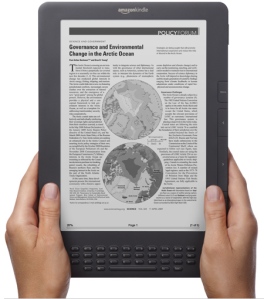
A new study shows that members of reading groups are using more e-books. The Amazon Kindle is leading the way, with the Barnes and Noble Nook coming in second.
(One could draw the opposite conclusion, too, and state that most readers still prefer traditional books.)
Shira S.








